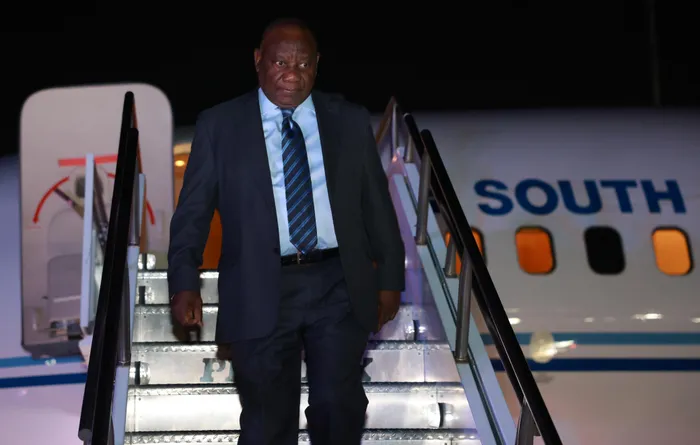Ramaphosa urges the UN to take urgent action on the global crises threatening peace
GLOBAL STAGE

President Cyril Ramaphosa arrives in New York City to spearhead a South African delegation during the High-Level Segment of the 80th Session of the United Nations General Assembly
Image: GCIS
In a poignant address during the General Debate of the 80th Session of the United Nations General Assembly in New York, President Cyril Ramaphosa emphasised the pressing need for global collaboration in addressing the multiple crises that jeopardise peace, development, and human dignity.
Speaking to a crowded assembly of world leaders on Tuesday, Ramaphosa articulated a sense of urgency, echoing a call for unity in confronting these challenges.
"The world faces unprecedented crises that demand an urgent response," Ramaphosa declared, stressing that immediate action is necessary to foster peace and stability in conflict-ridden regions.
Ramaphosa told world leaders that South Africa's 2025 G20 presidency will be guided by "Equality, Solidarity and Sustainability," aiming to re-centre Africa in global economic governance.
He warned that climate change continues to reverse hard-won development gains, particularly in the Global South. “Extreme weather events, like floods and droughts, are driving food insecurity, displacing populations, damaging infrastructure and destroying livelihoods.”
He also pointed to the debt crisis facing many developing countries. “Many countries with developing economies, especially in Africa and the Global South, do not have adequate capital to finance their development goals,” he said.
“They are indebted and are paying much more on debt servicing than they do on health and education.” Ramaphosa urged fairer lending rules and reforms to global financial institutions to support low-income economies.
The president reaffirmed South Africa’s call for reforms to the multilateral trading system, warning that trade is increasingly being used as a geopolitical weapon.
“Trade is now being used as a weapon against a number of countries in the world,” he said.
He called for the lifting of the United States’ decades-long embargo on Cuba, saying: “This unfair embargo must be lifted – and we want it lifted sooner rather than later.”
Amid global uncertainty, Ramaphosa praised the African Continental Free Trade Area (AfCFTA) as “a pragmatic example of constructive collaboration and cooperation” and said it has the potential to become the “central pillar of economic cooperation and integration” across the continent.
As part of efforts to promote global equity, he announced the formation of an Extraordinary Committee of Independent Experts on Global Wealth Inequality, chaired by Nobel laureate Professor Joseph Stiglitz.
The committee will present its first report to G20 leaders when they meet in Johannesburg in November, he said.
Ramaphosa strongly criticised the weakening of multilateral institutions and the growing disregard for international law.
He condemned the failure of the United Nations Security Council to respond effectively to worsening crises in places such as Gaza, Sudan and the Democratic Republic of the Congo.
On the humanitarian crisis in Gaza, Ramaphosa delivered a firm statement of condemnation. “There is growing global consensus that Israel is committing genocide in Gaza,” he said.
He welcomed global efforts to recognise the State of Palestine, saying this reflects “the determination of the global majority” to see a peaceful Palestine existing side by side with Israel.
On gender equality, Ramaphosa reaffirmed South Africa’s commitment to women’s empowerment and declared support for the election of a female UN Secretary-General.
He made a resounding call for the reform of the United Nations Security Council to better represent Africa and the Global South.
IOL Politics
Related Topics: